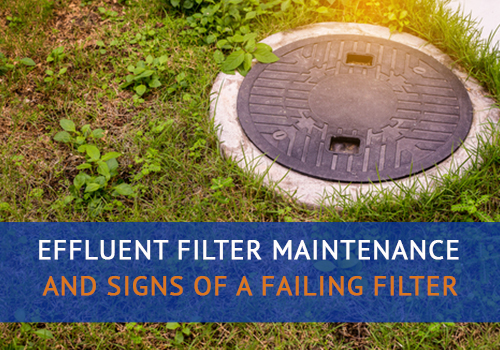Your septic system is made of several important components, including your systems effluent filter. Unseen and often forgotten, the effluent filter (or output filter) is an integral part in the health and longevity of your entire septic system. Like maintaining the rest of your septic system, effluent filter maintenance keeps your system healthy and doing its job. Luckily, effluent filter care is relatively inexpensive and can extend the life of your septic tank and drainfield.
What is an Effluent Filter?
Simply put, effluent filters are devices that filter your septic system’s wastewater (aka: effluent).
Your household’s wastewater travels to your septic tank. Here, the solid waste, such as fecal matter, breaks down into a sludge that later will be pumped out or decomposed by your septic tank’s bacteria. However, this water needs to exit the septic tank in order to make room for more waste.
This is where effluent filters come in.
Installed in front of your septic tank’s outlet, effluent filters create a screen barrier between the inside of the tank and the drainfield. The holes in the filter allow water to pass through while successfully catching the solid material.
Overtime, the filtered solid waste can build up on the effluent filters, reducing its efficiency. Neglecting a clogged effluent filter could lead to large, expensive problems. You could end up spending a couple thousand dollars replacing your septic system.
But, how do you tell when your effluent filter needs a cleaning or a replacement?

4 Major Signs of a Blocked Effluent Filter Prevented by Effluent Filter Maintenance
While you should always have a professional perform maintenance on your septic system, there are a few tell-tale signs that you are experiencing issues with a clogged septic filter.
There is a large amount of solid waste in your septic tank.
Solid waste builds up inside a septic tank when an effluent filter is obstructed for too long. The wastewater inside the tank has no outlet to the drainfield. A larger-than-normal amount of waste in your septic tank means it’s time to schedule an inspection.
Neglecting this issue could lead to more serious trouble like our next warning sign. Luckily the solution is easy, proper effluent filter maintenance.
You have wastewater backing up into your house.
If your septic tank is working correctly, you should never experience wastewater in your home. An improperly working effluent filter means that wastewater cannot escape the septic tank and into your drainfield. The wastewater has nowhere to drain except back into your house — yuck.
Gurgling noises coming from the drains, slower than usual drainage, and standing water in your bathtubs or sinks are all signs it’s time to call a professional.
You’re experiencing septic drainfield failure.
A drainfield allows for proper evaporation and disposal of wastewater. However, a saturated and stinky ground around your septic tank means you are experiencing septic system failure.
A broken or clogged effluent filter could easily cause this catastrophe.
Restoring a drainfield costs a pretty penny — much more than a new filter would have cost. But, this is easily avoidable with regular maintenance to your effluent filter and septic tank.
Your septic tank monitor is alerting you.
This one is an easy warning sign.
Some effluent filters come with an alarm that will alert you when it’s time to clean it. If you have a newer system, the alarm is more than likely above ground. However, if you have an older system, the alert may come from inside the tank. If this is the case, the sound coming from the monitor will be loud enough for you to hear when walking by the tank.
The good news is that your filter should be effective for several years. It is always a good idea to have a septic professional clean the filter during every septic pumping. This should be between 3-5 times a year.
Are Effluent Filters Mandatory for Septic Tanks in Florida?
The answer to this question is most definitely YES. Effluent filters are required by the state of Florida and should be installed by a professional. The Florida State Health Department has made it easy for you. Check out their website to read a list of filter models that meet Florida State Codes.
Remember that effluent filters can extend the life of your septic tank. They keep costs down and insure that your tank works efficiently and effluent filter maintenance is a simply way to prolong the life of your septic tank and drainfield. For more questions on which effluent filter is write for your septic system or to schedule regular maintenance, contact Advanced Septic at 352.242.6100.

